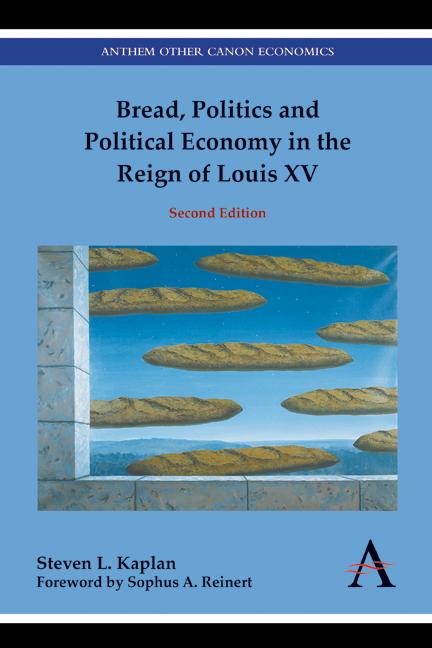Book contents
- Frontmatter
- Contents
- List of Illustrations
- Foreword to the Second Edition
- Acknowledgements
- List of Abbreviations
- Introduction
- Chapter I The Police of Provisioning
- Chapter II The Regulations and the Regulators
- Chapter III The Origins of Liberty
- Chapter IV The Response to Liberalization: Theory and Practice
- Chapter V Forcing Grain to Be Free: The Government Holds the Line
- Chapter VI The Reforms and the Grain Trade
- Chapter VII Paris
- Chapter VIII The Royal Trump
- Chapter IX The Government, the Parlements, and the Battle over Liberty: I
- Chapter X The Government, the Parlements, and the Battle over Liberty: II
- Chapter XI From Political Economy to Police: The Return to Apprehensive Paternalism
- Chapter XII Policing the General Subsistence, 1771–1774
- Chapter XIII The King's Grain and the Retreat from Liberalization
- Conclusion
- Bibliography
- Index
Chapter IX - The Government, the Parlements, and the Battle over Liberty: I
- Frontmatter
- Contents
- List of Illustrations
- Foreword to the Second Edition
- Acknowledgements
- List of Abbreviations
- Introduction
- Chapter I The Police of Provisioning
- Chapter II The Regulations and the Regulators
- Chapter III The Origins of Liberty
- Chapter IV The Response to Liberalization: Theory and Practice
- Chapter V Forcing Grain to Be Free: The Government Holds the Line
- Chapter VI The Reforms and the Grain Trade
- Chapter VII Paris
- Chapter VIII The Royal Trump
- Chapter IX The Government, the Parlements, and the Battle over Liberty: I
- Chapter X The Government, the Parlements, and the Battle over Liberty: II
- Chapter XI From Political Economy to Police: The Return to Apprehensive Paternalism
- Chapter XII Policing the General Subsistence, 1771–1774
- Chapter XIII The King's Grain and the Retreat from Liberalization
- Conclusion
- Bibliography
- Index
Summary
In the modern scholarly view of the sixties, which has brought considerable order and sophistication to the study of eighteenth-century France, the dominant motif is constitutional, the lingering crisis is the Brittany affair, and the denouement is the stunning coup engineered by Maupeou. I have viewed the decade from a different vantage point. I have suggested that another issue preoccupied Frenchmen in the sixties and in many ways cut more deeply and touched more people than the well-known political confrontation. I have focused upon a social and political crisis concerning subsistence, which set the stage for the outburst of absolutism in 1770–71 by producing widespread economic disruption and recession.
From this perspective, the main themes of parlementary action eddy against the prevailing current. What is striking are not the claims of parlementary union and indivisibility, but the deep divisions among the sovereign courts; not the political pretensions of the parlements, but their vitally important administrative and regulatory responsibilities; not the obscurantist attitudes and obstructionist tactics for which they are famous, but their critique of government mismanagement and royal abuse, which had much in common with what we conventionally call “enlightened”; not their adamantine hostility to change and their persecution of truth, but their inability to decide amongst themselves what changes were best and what opinions were true; not their egotistical defense of privilege, but their discussion of the nature of la chose publique; not their desire to curtail royal authority, but their debate on the responsibilities of kingship. The parlements of the grain crisis were the same parlements which thwarted Bertin's intelligent reforms, burned LaBarre, and mercilessly harassed the king. But the view of France from the marketplace differed sharply from the scene perceived from La Chalotais’ prison or the fauteuil in which Louis presided over lits de justice, even as it differed from vantage points in Rouen, Toulouse, Grenoble, and Paris. The issues raised by the grain crisis differed from the problems posed by the constitutional quarrel and elicited different responses from parlements for whom politics was a very complex and subtle business. The constitutional question, as important as it was, must not obscure the existence of other matters of urgent public concern and other dimensions of parlementary behavior.
- Type
- Chapter
- Information
- Bread, Politics and Political Economy in the Reign of Louis XV , pp. 408 - 450Publisher: Anthem PressPrint publication year: 2015



